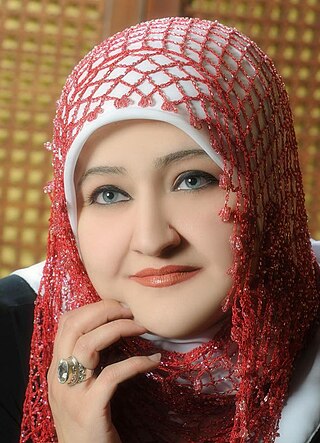
Ali Ahmad Said Esber, also known by the pen name Adonis or Adunis, is a Syrian poet, essayist and translator. Maya Jaggi, writing for The Guardian stated "He led a modernist revolution in the second half of the 20th century, "exerting a seismic influence" on Arabic poetry comparable to T.S. Eliot's in the anglophone world."
Arabic literature is the writing, both as prose and poetry, produced by writers in the Arabic language. The Arabic word used for literature is Adab, which comes from a meaning of etiquette, and which implies politeness, culture and enrichment.
Bensalem Himmich is a Moroccan novelist, poet and philosopher with a PhD in Philosophy from the University of Paris, who teaches at the Mohammed V University, Rabat. He served as Minister of Culture from 29 July 2009 to 3 January 2012.

Abdul-Nabi Isstaif is a professor of comparative literature, critical theory and translation at Damascus University.

Syrian literature is modern fiction written or orally performed in Arabic by writers from Syria since the independence of the Syrian Arab Republic in 1946. It is part of the historically and geographically wider Arabic literature. Literary works by Syrian authors in the historical region of Syria since the Umayyad era are considered general Arabic literature. In its historical development since the beginnings of compilations of the Quran in the 7th century and later written records, the Arabic language has been considered a geographically comprehensive, standardized written language due to the religious or literary works written in classical Arabic. This sometimes differs considerably from the individual regionally spoken variants, such as Syrian, Egyptian or Moroccan spoken forms of Arabic.

Samar Samir Mezghanni is a Tunisian children's author.

The Sheikh Zayed Book Award is a literary award begun in the UAE. It is presented yearly to "Arab writers, intellectuals, publishers as well as young talent whose writings and translations of humanities have scholarly and objectively enriched Arab cultural, literary and social life." The first award was in 2007. The total value of the prizes is DH 7,000,000 making it one of the richest literary awards in the world.

Issa J. Boullata was a Palestinian scholar, writer, and translator of Arabic literature.
The Sultan Bin Ali Al Owais Cultural Awards are a biennial prize for literary and cultural achievement in the Arab world. It is administered by the Sultan Bin Al Owais Cultural Foundation of the United Arab Emirates. The award was established by the late Emirati businessman and philanthropist Sultan Bin Ali Al Owais. The awards were first given out in 1988-89.

Samar Yazbek is a Syrian writer and journalist. She studied Arabic literature at Tishreen University (Latakia). She has written in a wide variety of genres including novels, short stories, film scripts, television dramas, film and TV criticism, and literary narratives. Several of her works have been translated from the Arabic original into other languages.
Ahmad Shawqi Daif was an Arabic literary critic and historian. He is considered one of the most influential Arab intellectuals in the 20th century.

Jan Dost,, is a Syrian Kurdish poet, writer and translator. He has written several novels both in his native Kurmanji Kurdish language and in Arabic. He is known as a prolific Kurdish writer, with several of his novels in the context of the Syrian civil war. Apart from his own works, Dost has translated Kurdish and Persian works into Arabic, including Mem and Zin, a classical Kurdish love story, written by Ahmad Khani in the 17th century and considered as the national epic of the Kurdish people.
Affaf Tobbala is an Egyptian television documentary director and producer and an author, primarily of children's literature. Tobbala has been nominated for and received a number of literary awards in Egypt and abroad. Her 2006 book, Sika and Mokka, received the 2007 Suzan Mubarak Prize for Children's Literature and was included on the 2010 International Board on Books for Young People (IBBY) List of Honor.

Sanaa Shalan is a Jordanian contemporary writer, from the Arab novelty generation. She writes novels, short stories, theater, scenario and children's literature. She holds a doctorate degree in modern literature. Shalan works as an instructor at the University of Jordan.
Samar Mahfouz Barraj is an author, poet, playwright, songwriter, trainer, and children's literature translator. A number of her books have been nominated and won prestigious awards from all over the world, including Arabic and regional awards.
Jekar Khourchid is a Syrian children's author. He studied Arabic literature at Al-Baath University in Homs. His first story collection "The Jackal and The Lion" won the 2006 Sharjah Award for Arab Creativity in children's literature. Khourchid stopped writing for a while due to his father's illness and death, and then returned to writing in 2012. He has published more than 120 books and nearly 100 books in print. In 2015, Khourchid left Syria and immigrated to the Netherlands.
Abdul Lateef Al Warari is a Moroccan poet and literary critic.
Abd al-Qadir Hassan Al-Qitt was an Egyptian poet, critic, and writer. He was born in Belqas, Dakahlia Governorate, and held a doctorate in Arabic literature and literary criticism. Al-Qat edited the “Poetry” magazine in 1964, and was appointed Dean of the Faculty of Arts at Ain Shams University in 1972. He received the King Faisal International Prize in Literature in 1980 and the State Appreciation Award in 1985, and was the editor-in-chief of the “Ibdaa” magazine for theatre and cinema in 1983.
Hayfa Basil al-Baytar is a Syrian novelist, short story writer and ophthalmologist. She has won the Abi Al Qassem Al Shabbi prize for her collections The Fallen (2000) and The Whore (2003).

Sawad Hussain is a writer and translator of contemporary Arabic literature into English, based in Cambridge, United Kingdom. She is known for her award-winning translations, as lecturer and speaker on the field of literary translation and for her contributions to contemporary Arabic literature in English-language publications.










